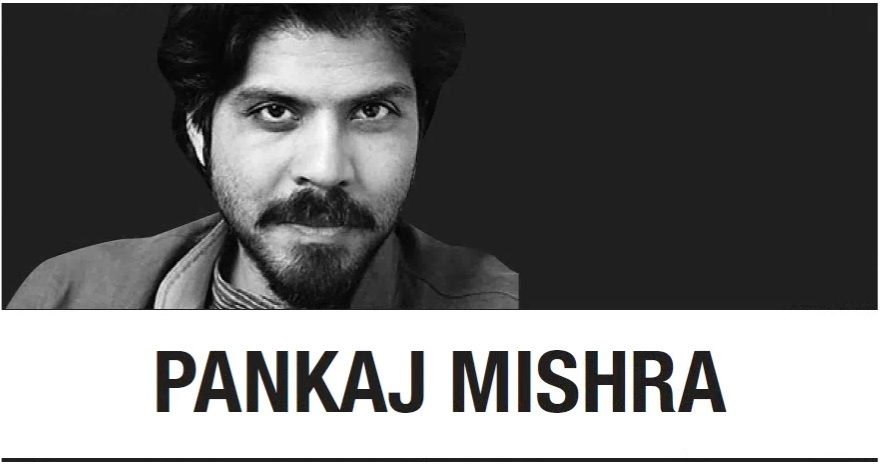
Commentators are aghast that Tory members of Parliament have not replaced Johnson with a leader less inclined to incite violence. Even former Conservative Prime Minister John Major recently complained that the party’s “reputation is being shredded” as Johnson forces his colleagues to “defend the indefensible” and asks the public “to believe the unbelievable.”
Together with Republicans in the United States and members of India’s Hindu nationalist Bharatiya Janata Party, Britain’s Tories are indeed traveling to a very dark place. Yet it’s not enough to blame these once-respectable right-wing parties for going rogue. The truth is that their decision to stand behind leaders such as Johnson, former US President Donald Trump and Indian Prime Minister Narendra Modi reflect a sinister shift in public sentiment.
Arguably, a sizable share of the electorates in the UK, US and India no longer minds, and indeed enjoys, the flagrant violation of political and ethical norms by their leaders.
Certainly, those voters ignored too many abysmal facts when electing such men in the first place. Modi was trailed on his way to high political office by accusations that he condoned a massacre of Muslims under his watch in 2002. Trump and Johnson had made careers out of broadcasting falsehoods about a range of issues, from former US President Barack Obama’s birthplace to the European Union. Indeed, Johnson was fired from his job at the Times of London for dishonesty.
Nor do their supporters show any signs of abandoning these leaders because they’ve registered mixed records in office. Brexit, achieved through a mendacious campaign, has brought no tangible benefits to the United Kingdom. The Indian economy was foundering even before Modi’s mismanagement of the pandemic made it worse. The damage inflicted by Trump’s presidency on US institutions is too well-known to be recounted.
Much political discourse relies upon the expectation that politicians will be rewarded or punished for how effectively they advance the interests of those who vote for them. What the persistence of Johnson, Trump and Modi confirms once again is that passions have become far more politically consequential than interests.
The most potent of these passions is fear. Mostly groundless but deftly manipulated, the fear of “replacement” by darker-skinned populations, of being outbred by Muslims, of being left behind by immigrants stealing jobs and of being emasculated by women has come to determine many people’s choice of political party.
These voters like their political representatives more if they offer a wide range of contemporary figures to loathe. Among the most satisfactory targets are upstart minorities and arrogant metropolitan elites who have profaned cherished national icons with their radical iconoclasm.
The key to the resilience of Johnson and his peers lies in their mastery of this highly emotive, wholly irrational but fruitful political discourse. Their aggressive campaigns — against minorities and leftists and liberals, or such bogeys as Critical Race Theory — have reshaped how we understand and conduct political life.
This trend is not irreversible. Destructive passions fade over time, after all, and faster if there are viable visions of material improvement on offer in politics. But those critics of demagogues who seek to deploy prevailing sentiments to their short-term ends are making the situation worse.
In Britain, Starmer has taken to emphasizing his anti-woke and pro-Brexit credentials in order to woo hard-line Tory voters to his party. He would grow his political capital a lot more quickly if he promised to reverse what is increasingly the most unpopular aspect of Brexit: the exit, enforced by Johnson, from the European single market, which has led to high import costs, export barriers, shortages of food and rising energy costs.
Likewise, India’s opposition Congress party could stop presenting itself as the civilized face of Hinduism and focus on Modi’s numerous fiascoes as an administrator. The Democrats ought to cease mimicking the Republican obsession with “wokeness” and make faster progress to reverse Trump-era policies against immigration that, together with the pandemic, have helped slow down the US economy.
Economic interests may not be as viscerally appealing as the satisfactions of hating something or other. But a political life determined largely by passions stoked by demagogues will not only keep Johnson, Modi and Trump strong; it will consume what remains of democracy in its three former strongholds.
Pankaj Mishra
Pankaj Mishra is a Bloomberg Opinion columnist. -- Ed.
(Tribune Content Agency)
-
Articles by Korea Herald









![[Kim Seong-kon] Democracy and the future of South Korea](http://res.heraldm.com/phpwas/restmb_idxmake.php?idx=644&simg=/content/image/2024/04/16/20240416050802_0.jpg&u=)








![[KH Explains] Hyundai's full hybrid edge to pay off amid slow transition to pure EVs](http://res.heraldm.com/phpwas/restmb_idxmake.php?idx=652&simg=/content/image/2024/04/18/20240418050645_0.jpg&u=20240418181020)

![[Today’s K-pop] Zico drops snippet of collaboration with Jennie](http://res.heraldm.com/phpwas/restmb_idxmake.php?idx=642&simg=/content/image/2024/04/18/20240418050702_0.jpg&u=)